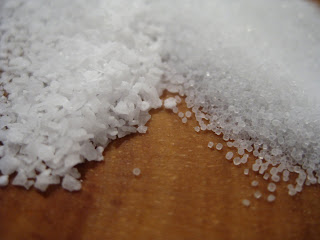
Salt. Its one of the most prized and ancient seasonings in the kitchen. Now a days we all take salt for granted. Not many of us stop to think about the very important role that salt plays. Does it add flavor? Yes. Does it act as a preservative? Sure does! Does it provide essential minerals that our bodies need to survive? Absolutely!
The media has really demonized salt lately, something that it may or may not deserve, depending on how you use it. Processed foods are filled with sodium as it acts as a preservative. When you are cooking with processed foods you will NOT need to add additional salt for the most part, as the ingredients have already been salted for you in the factory. But, if you're a from scratch cooker like the Kitchen Witch, you'll be adding salt throughout the cooking process, building layers of flavor as you go.
Think about it. If you're making soup from scratch, you're starting with water, meat & veggies. They all have flavor on their own, but they need salt to bring out their best. You'll salt the water, salt after adding the veggies, salt again while cooking & a final taste before serving to determine the salt level. I promise you if you salt through out the cooking process you'll never, ever need to salt your food at the table.
As a serious cook I take full offense if someone asks for salt at the table. That means to me that I've not done my job properly. If you've ever seen Julie & Julia, you'll remember that Julie was making Bouef Bourgioune and her husband salted the dish. Her expression was priceless. She said "Is it bland?" He said "Not anymore!" She almost died there, and I can appreciate that 100%. Under salting is just as bad, but lots easier to correct, than over salting.
Speaking of over salting, it happens to the best of us. Here's a secret Kitchen Witch tip: If you over salt a dish add a raw potato cut in half to the dish. Let it cook 15 min or so & discard the potato. Potatoes absorb a LOT of salt, so chances are good you can save the dish.
Salt also changes how food cooks. If you add salt too soon to a sautee, you'll have a hard time getting food to brown as the salt draws the water out of whatever its put on . Don't salt your onions prior to cooking them if you want a nice caramelized color & flavor, save that for the end seasoning.
One final word on salting and that is taste! Taste your dish often, through out the cooking process. If its bland, add some more salt. If you're not sure if it needs more salt let it cook another 15 min & taste again.

Here are a few commonly asked questions regarding salt:
1. What the heck is Kosher salt?
Kosher salt (or Koshering salt as its known in the UK) is large flat flakes of salt that has not been iodized. The large flat flakes stick to the surface of meats better, drawing out liquids, thus 'Koshering' the meat, an ancient method of preservation. Despite the name adding Kosher salt to food does not make your food Kosher.
2. Why do chef's use Kosher salt?
Most chefs use Kosher salt for a few reasons. First, the flakes are large & you can handle it with your fingers, adding a pinch here & there. Have you ever tried to sprinkle your salt shaker over a pot of hot soup? The steam condenses on the salt shaker holes, clogging the whole works up. Most people then take the lid off, hoping to add just a dash and then it happens. The salt comes pouring out and ruins the dish. When you're handling the salt with your hands you know how much you're adding, not a guessing game of how much is flowing out of the holes in a shaker.
3. What makes Kosher salt so gosh darn special?
Well, in a word, flavor! Chef's use Kosher salt rather than table salt is for flavor. Table salt has been iodized, meaning iodine has been added, which alters the flavor just slightly. Iodine is added to table salt to help prevent thyroid related iodine deficiencies, such as goiters. FYI, the US standard for iodized salt is 46-77 ppm vs the UK's standard of 10-22 ppm. If you want a true salt flavor, with out any additional tag along flavors, reach for the Kosher salt.

Kosher salt on left, Iodized table salt on right, both Morton brand
4. Can I use regular table salt in place of Kosher salt?
You sure can, with modifications. Kosher salt grains are larger they take up more volume than table salt. This means that if a recipe calls for 1 t salt, and its tested using table salt, you'd have to use 2 t of kosher salt to equal the same saltiness. Conversely if the recipe calls for Kosher salt, say 1 t worth, you'd have to use only 1/2 t of table salt.
PLEASE NOTE THAT ALL KITCHEN WITCH RECIPES USE KOSHER SALT UNLESS OTHERWISE NOTED.
If you have any salt questions please feel free to post them her under COMMENTS. Andrea the Kitchen Witch reads all of your comments & your questions will be answered!



2 comments:
I am so with you on salt! While I do think it's easy to rely too much on salt rather than trying various herbs and spices, salt definitely brings out flavor and is not the evil it's been made out to be. I've been alternating using Kosher salt and unrefined sea salt. The flavor of the unrefined sea salt is just fantastic -- and so many minerals. Thanks for a great post!
Great post. I am also obsessed with salt. I am lucky to have a salt shop around the corner which makes it far to easy to try smoked or black, or cherry salts. Kosher and sea are my go to salts for everyday though.
Post a Comment